VOTING RIGHTS
What's at Stake: Stories From NC Voters Who Could Be Denied The Right to Vote
Originally published in 2018, these stories illustrate the adverse impacts that North Carolina’s voter ID law (S.B. 824) could have on NC voters. See Holmes v. Moore for more information about the unconstitutional NC photo voter ID law.
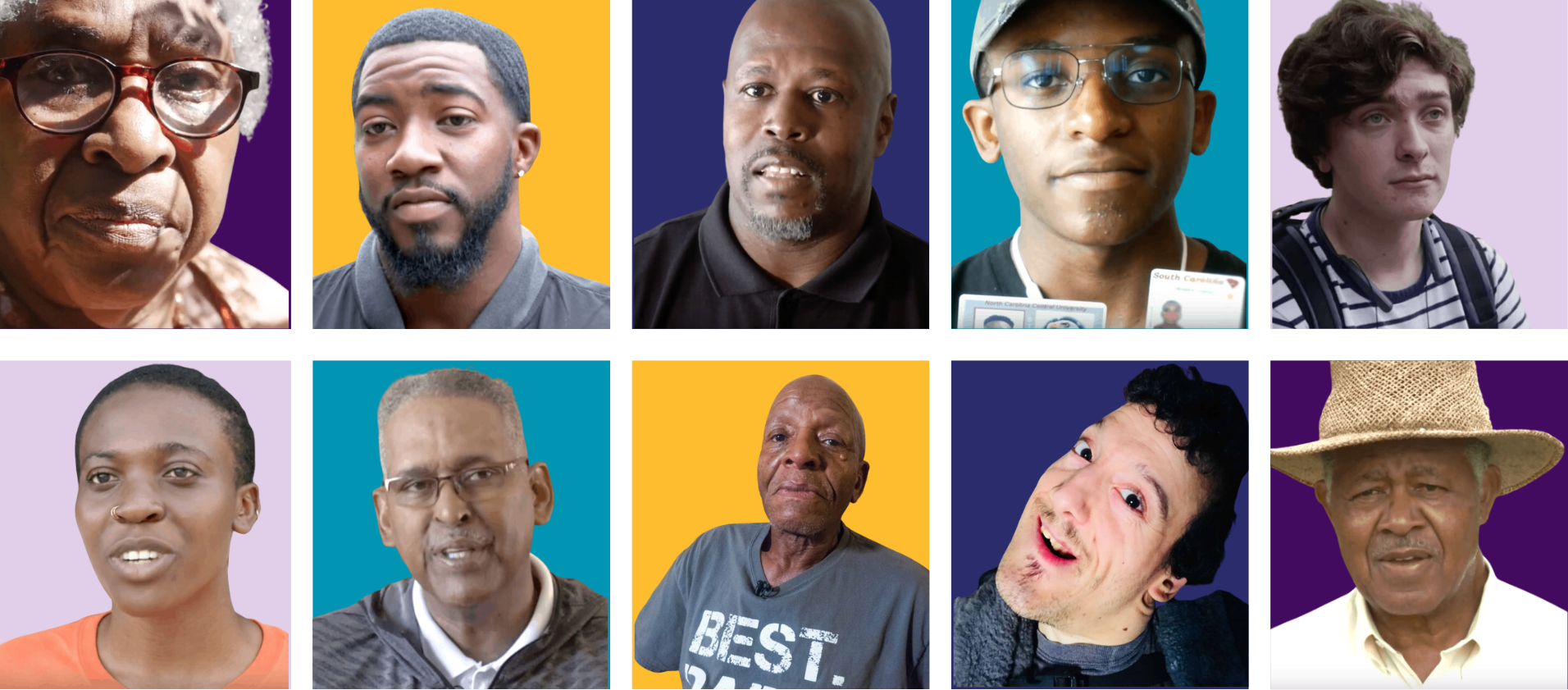
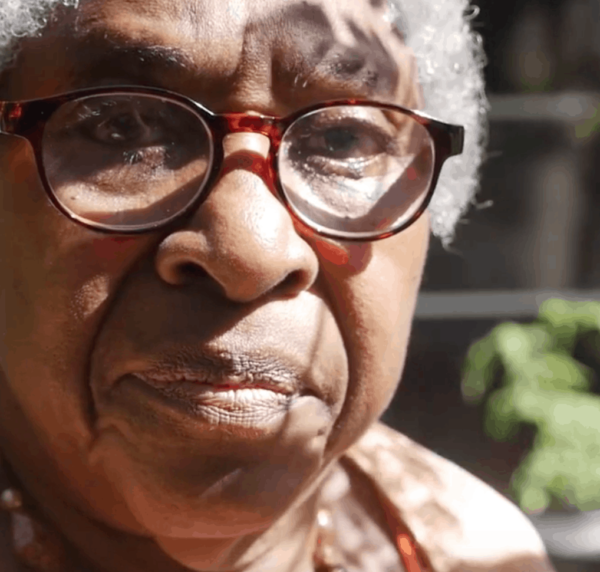 Esphur shares her experience voting with a provisional ballot and voices her concerns with voter accessibility.
Esphur shares her experience voting with a provisional ballot and voices her concerns with voter accessibility.
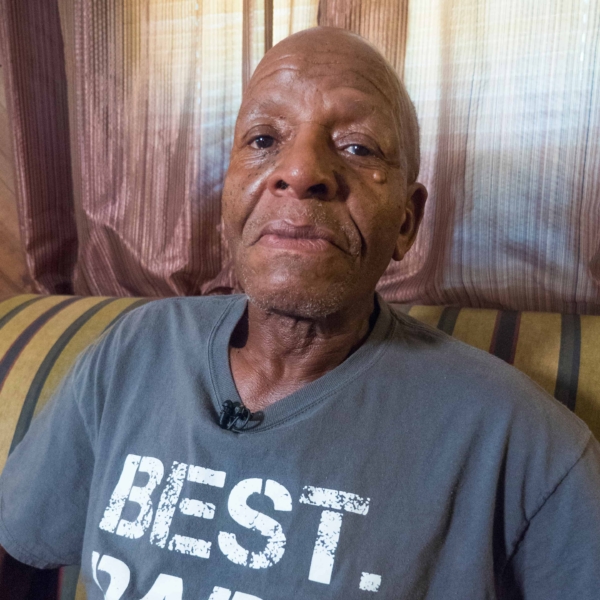 Fred Culp is a 78 year-old resident of Waxhaw, North Carolina. He is originally from South Carolina but has lived in North Carolina for the last 45 years. He prides himself on being the best grandpa in the world. He vividly remembers growing up in the segregated South, having to enter the side doors of restaurants to be served. Fred explained that sometimes circumstances in the south caused you “to reach a boiling point.” He knew “what was right and wrong before things started changing in the south.” Fred demonstrated this by following Dr. Martin Luther King and Reverend Abernathy. Fred participated in a sit-in at one of the restaurants that forced him to enter through the side door.
Fred Culp is a 78 year-old resident of Waxhaw, North Carolina. He is originally from South Carolina but has lived in North Carolina for the last 45 years. He prides himself on being the best grandpa in the world. He vividly remembers growing up in the segregated South, having to enter the side doors of restaurants to be served. Fred explained that sometimes circumstances in the south caused you “to reach a boiling point.” He knew “what was right and wrong before things started changing in the south.” Fred demonstrated this by following Dr. Martin Luther King and Reverend Abernathy. Fred participated in a sit-in at one of the restaurants that forced him to enter through the side door.
When Fred lived in South Carolina, he had a niece working at the Highway Department help him get a South Carolina government ID. That South Carolina ID expired over ten years ago. Fred attempted to get a North Carolina ID when he moved here but was unsuccessful. He was told that his South Carolina ID could not be used to obtain a North Carolina ID. Fred then tried to get copy of his birth certificate so he could get a North Carolina ID. However, Fred has had difficulty obtaining this document as well because of a discrepancy in the spelling of his mother’s name in South Carolina state records. Fred hasn’t driven for some time because of a neck injury—he relies on his wife for transportation.
In 2016, Fred went to vote as he does for other elections—Fred understands the importance of voting. Because Fred did not have a North Carolina driver’s license he was forced to fill out a provisional ballot. Fred still does not have a North Carolina-issued picture ID and is at risk of being disenfranchised in the future if the Voter ID Amendment passes.
Nearly 140,000 African-American registered voters in North Carolina lack a government issued picture ID—indeed, African Americans make up 36.67% of North Carolina registered voters lacking ID despite being only 22.45% of the registered voters in the state. Like Fred, these North Carolinians could be denied their fundamental right to vote if the Voter ID Amendment is approved in November, giving the legislature a blank check to enact a restrictive photo ID requirement for voting.
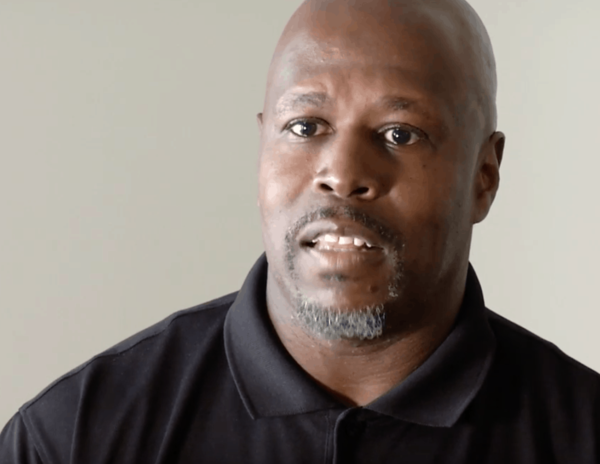 Daniel Earl Smith has lived in Concord, North Carolina for five years now, and has been a regular voter ever since moving to the state from Pennsylvania. He runs his own courier and delivery business. Daniel has five children ranging from ages thirteen to twenty-three. Daniel’s wife is the member of the family that keeps up with politics the most, but Daniel’s experience voting in 2016 when a voter ID requirement was in place has motivated him to speak out against voter ID laws.
Daniel Earl Smith has lived in Concord, North Carolina for five years now, and has been a regular voter ever since moving to the state from Pennsylvania. He runs his own courier and delivery business. Daniel has five children ranging from ages thirteen to twenty-three. Daniel’s wife is the member of the family that keeps up with politics the most, but Daniel’s experience voting in 2016 when a voter ID requirement was in place has motivated him to speak out against voter ID laws.
In 2016, like all North Carolina drivers have to do from time to time, Daniel had to get a new driver’s license because his old license expired. He went to the DMV and obtained a new license. However, his replacement license had to be mailed to him. The DMV gave him a temporary paper license to use until he received the official replacement. The temporary license included his name, address and a photo of his face. On Election Day, Daniel only had this temporary license, not his replacement license. Because the temporary license was not acceptable ID under the voter ID law, Daniel was forced to cast a provisional ballot. Unfortunately, his vote was not counted. Aware of the struggles African Americans faced throughout history to give him the right to vote, he was disappointed and embarrassed by the ordeal. This is why Daniel is standing up today urging that North Carolinians vote against this Voter ID proposed amendment.
Of the millions of North Carolina driver’s licenses issued in this state, approximately 750,000 driver’s licenses expire and need renewing every year. Many North Carolina voters like Daniel, who may be without ID, could be denied their fundamental right to vote if the Voter ID Amendment is approved in November, giving the legislature a blank check to enact a restrictive photo ID requirement for voting.
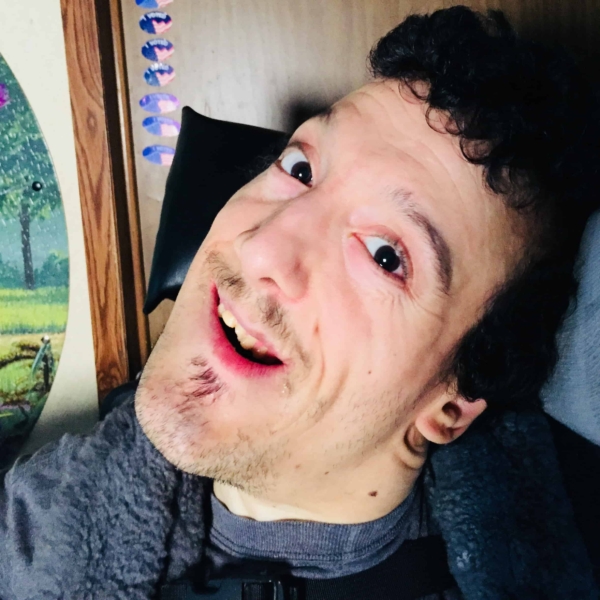 Jabari Holmes is 42 years old and lives in Wendell, North Carolina. He was born with severe cerebral palsy that has confined him to a wheelchair. He lives with his 82-year-old father and 69-year-old mother. Jabari’s medical condition requires full-time care, prevents him from driving, and makes it difficult for him to travel at all. Because of his medical condition, Jabari is non-verbal, but he uses a communication board, voice activator and an eye gaze computer to communicate with his family and the world. He is able to write out sentences using that technology. Jabari has voted in person in every election but one since he turned 18, despite the challenges involved in doing so. Jabari insists on going into the polling place to vote because this act confirms to him that he is an important part of society and makes him feel like he’s part of his community. After North Carolina enacted a voter ID law in 2013, Jabari’s mother Elizabeth tried very hard to get him a photo ID from the DMV, but she was unsuccessful because she does not have a copy of his social security card. Despite the demands of caring for Jabari, she spent a significant amount of time trying to get a copy of his social security card so that he could get a DMV-issued non-operator’s license, but she was not able to do so. Elizabeth helps Jabari get to the polling place every election, but sadly she hasn’t been able to help Jabari get a photo ID.
Jabari Holmes is 42 years old and lives in Wendell, North Carolina. He was born with severe cerebral palsy that has confined him to a wheelchair. He lives with his 82-year-old father and 69-year-old mother. Jabari’s medical condition requires full-time care, prevents him from driving, and makes it difficult for him to travel at all. Because of his medical condition, Jabari is non-verbal, but he uses a communication board, voice activator and an eye gaze computer to communicate with his family and the world. He is able to write out sentences using that technology. Jabari has voted in person in every election but one since he turned 18, despite the challenges involved in doing so. Jabari insists on going into the polling place to vote because this act confirms to him that he is an important part of society and makes him feel like he’s part of his community. After North Carolina enacted a voter ID law in 2013, Jabari’s mother Elizabeth tried very hard to get him a photo ID from the DMV, but she was unsuccessful because she does not have a copy of his social security card. Despite the demands of caring for Jabari, she spent a significant amount of time trying to get a copy of his social security card so that he could get a DMV-issued non-operator’s license, but she was not able to do so. Elizabeth helps Jabari get to the polling place every election, but sadly she hasn’t been able to help Jabari get a photo ID.
Jabari has two great passions in life: politics and UNC basketball. His walls at home are covered with UNC memorabilia, and he watches the news daily to stay informed on political issues. Jabari is a passionate, eligible and regular voter who, because he does not have a photo ID, could be disenfranchised if the constitutional amendment requiring photo ID is approved in November.
According to census data, as many as 122,000 North Carolinians may have disabilities that prevent them from driving, meaning they may lack a driver’s license or other photo ID just like Jabari. Those citizens could be denied their fundamental right to vote if the Voter ID Amendment is approved in November, giving the legislature a blank check to enact a restrictive photo ID requirement for voting.
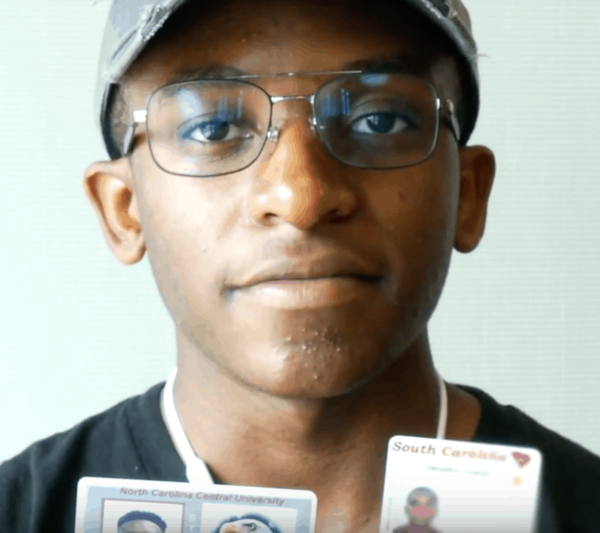
Jaden Peay is a sophomore at North Carolina Central University. Jaden chose to major in political science because he’s passionate about voting and participating in the political system. Jaden wants to go to law school, eventually become a judge, and work to make the criminal justice system more equitable for everyone. Jaden grew up in South Carolina and still has a South Carolina driver’s license, as well as an NCCU student identification card with his picture. When Jaden first stepped onto campus in 2017 and began to appreciate the extent to which politicians were trying to silence voters’ voices, a fire ignited inside him. Jaden started volunteering to register other students to vote. Jaden is passionate about encouraging voting because he believes it gives his community the power to change policy and hold our representatives accountable.
Last year, as a freshman, Jaden voted in Durham for the first time with no problem. However, if the Voter ID Amendment passes, he may not have that same experience in the future. Under previous North Carolina voter ID requirements, Jaden’s South Carolina driver’s license and NCCU student ID would not have been acceptable. In fact, in March 2016, when a voter ID requirement was in place, many college students in his same situation were disenfranchised. Although Jaden lives in Durham, voted last year, and volunteers to register other students to vote, the Voter ID Amendment, if it passes, could put his right to vote in jeopardy.
Over 72,000 out-of-state students attending universities in this state may, like Jaden, lack North Carolina driver’s licenses and could be denied their fundamental right to vote if the Voter ID Amendment is approved in November, giving the legislature a blank check to enact a restrictive photo ID requirement for voting.
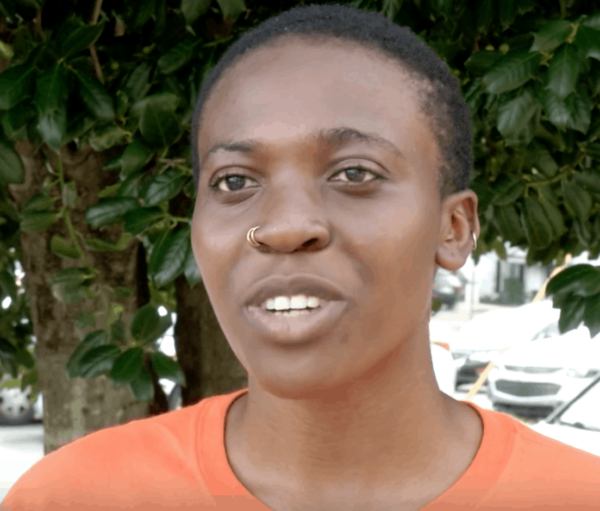 Mina is a voting rights community organizer living in Durham, North Carolina. Originally from Georgia, Mina attended college at Duke University. After graduating in 2017, she stayed in North Carolina to work, managing a team that registers young people to vote. Mina believes voting is essential to our democracy and that our electoral process should be designed to make voting easy and to give everyone a voice.
Mina is a voting rights community organizer living in Durham, North Carolina. Originally from Georgia, Mina attended college at Duke University. After graduating in 2017, she stayed in North Carolina to work, managing a team that registers young people to vote. Mina believes voting is essential to our democracy and that our electoral process should be designed to make voting easy and to give everyone a voice.
Before the 2016 March primary, when Mina was still a student at Duke, she received an email encouraging her to go vote. She wanted to vote in Durham because she lived there and was engaged with her local community. Mina arrived at an early voting site with two pieces of photo identification: her Georgia driver’s license and her Duke University photo student ID. The polling staff told her that these documents were insufficient to satisfy North Carolina’s voter ID requirement that was in place at the time. Mina was not even offered a provisional ballot. Instead, Mina was told to go to the DMV to get a North Carolina ID. In the midst of school and other responsibilities, she did not have time to obtain the documents needed to get a North Carolina driver’s license before the voting period ended three days later (her birth certificate and other documents were at her family’s home in Georgia). Mina was disappointed that she did not get to vote, and, indeed, recognizes that she was denied a fundamental right to participate in the political process. Mina is worried that many others suffered the same fate and could possibly be disenfranchised by the future voter ID requirements if the Voter ID Amendment passes in November.
Over 72,000 out-of-state students attending universities in this state may, like Mina, lack North Carolina driver’s licenses and could be denied their fundamental right to vote if the Voter ID Amendment is approved in November, giving the legislature a blank check to enact a restrictive photo ID requirement for voting.
 Noah is a student at the University of North Carolina at Chapel Hill. Noah is from Vermont but moved with his family to Carrboro, North Carolina in 2014. Noah is majoring in computer science and mathematics. Noah has invested in his new community by staying informed and engaged in North Carolina politics. Unfortunately, he has experienced firsthand the impact our State’s previous Voter ID law.
Noah is a student at the University of North Carolina at Chapel Hill. Noah is from Vermont but moved with his family to Carrboro, North Carolina in 2014. Noah is majoring in computer science and mathematics. Noah has invested in his new community by staying informed and engaged in North Carolina politics. Unfortunately, he has experienced firsthand the impact our State’s previous Voter ID law.
Noah turned 18 and became eligible to vote before the 2016 North Carolina primaries, while he was still in high school. At the time of the March 2016 primary, Noah did not have a driver’s license or a learner’s permit. Noah did have a high school student ID with his picture and name on it. On Election Day, Noah went to the polls with his student ID and voter registration card in hand. Because he did not have what was deemed acceptable ID, he had to fill out a provisional ballot. Noah’s provisional vote was not counted and he was disenfranchised. Noah’s first voting experience left him feeling frustrated, realizing that he was part of a demographic that “powerful people wanted to silence,” and wondering if our democracy is a sham. Noah classifies himself as an introvert, but this experience motivated Noah’s decision to speak up and share his story.
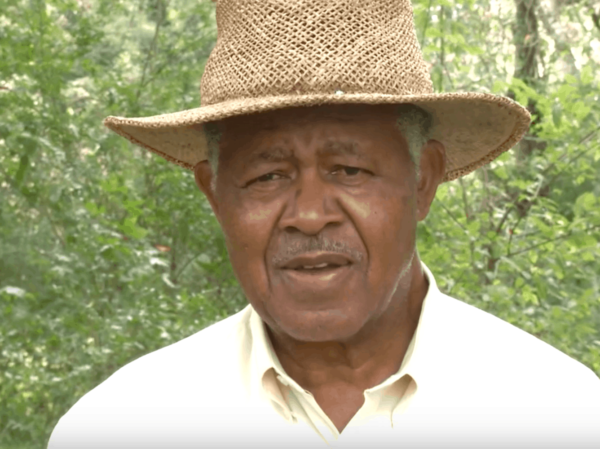 Paul Kearney is a resident of Warrenton, North Carolina. Paul lives in a tight-knit community where everyone knows each other on a first-name basis. His family has been in the community for four generations. Paul is an army veteran, and after his father passed away he took on the responsibility of taking care of the family farm. For employment, Paul both tends to the farm and runs a construction business with his son.
Paul Kearney is a resident of Warrenton, North Carolina. Paul lives in a tight-knit community where everyone knows each other on a first-name basis. His family has been in the community for four generations. Paul is an army veteran, and after his father passed away he took on the responsibility of taking care of the family farm. For employment, Paul both tends to the farm and runs a construction business with his son.
During the afternoon on Election Day in the March 2016 primary, one of Paul’s cows got out of his farm’s fenced pasture. Because he had to track down the missing cow and return it to the pasture, Paul didn’t get to his polling place until the polls were almost about to close. His family has voted at the same precinct for decades, and when Paul arrived at his precinct, the polling staff greeted him by name. However, because of the photo ID requirement, polling staff was required by law to ask Paul for his ID even though they knew him. Unfortunately, Paul left his ID in his other pants because he changed clothes to handle the cattle situation. He didn’t have time to go home and get his ID before the polls closed. Even though Paul has “a billfold full of IDs,” his only option was to cast a provisional ballot. And because he did not understand that he needed to take additional steps (go back to the county board of elections) to ensure his ballot was counted, Paul was disenfranchised.
For Paul, these laws are reminiscent of the barriers African Americans faced to vote in the past. Paul is suspicious of voter ID laws because he knows that the law would serve no purpose in his community where everyone knows everybody and he was identified as soon as he stepped in the door.
Life happens to us all, and many North Carolina voters like Paul, who may have ID but not with them, could be denied their fundamental right to vote if the Voter ID Amendment is approved in November, giving the legislature a blank check to enact a restrictive photo ID requirement for voting.
 Richard was raised in Rocky Mount, North Carolina, and has spent most of his adult life working in both New York and North Carolina. A few years ago Richard came back home to North Carolina for good to take care of his father, who was in declining health, and to take over the family laundry business. While living in New York, Richard’s wallet, which contained his North Carolina drivers license, was stolen. Richard went through a rigorous process to get a New York government ID as a substitute.
Richard was raised in Rocky Mount, North Carolina, and has spent most of his adult life working in both New York and North Carolina. A few years ago Richard came back home to North Carolina for good to take care of his father, who was in declining health, and to take over the family laundry business. While living in New York, Richard’s wallet, which contained his North Carolina drivers license, was stolen. Richard went through a rigorous process to get a New York government ID as a substitute.
During the 2016 primary, while back in North Carolina, Richard went with his parents to vote at the same precinct in which he had voted in the past. Richard had only his New York ID at the time, which was not acceptable ID under the voter ID requirement in place at the time, and was therefore required to cast a provisional ballot. That provisional ballot, ultimately, was not counted. Richard never had a problem voting in this precinct in the past, and his experience in 2016 upset him. Although he has volunteered for many “Get Out To Vote” efforts, Richard believes that some of our representatives are working to make it harder for people to vote. His experience reveals that anyone could potentially be disenfranchised by the proposed Voter ID Amendment.
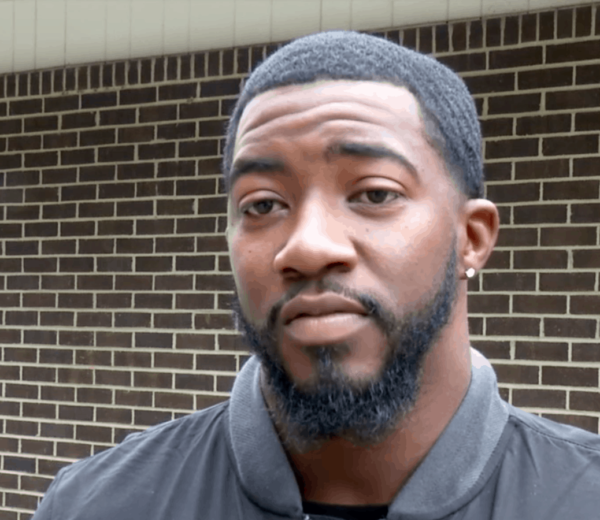 Terence is a 28-year-old resident of Charlotte, North Carolina. He moved to North Carolina from Mississippi to attend Shaw University. Terence was a student-athlete and a Computer Information Systems major. After college, he moved to Charlotte to take advantage of a job opportunity. Terence still lives and works in Charlotte and has decided to make the city his new home.
Terence is a 28-year-old resident of Charlotte, North Carolina. He moved to North Carolina from Mississippi to attend Shaw University. Terence was a student-athlete and a Computer Information Systems major. After college, he moved to Charlotte to take advantage of a job opportunity. Terence still lives and works in Charlotte and has decided to make the city his new home.
During the 2016 primary, Terence went to vote at a precinct in Charlotte. At this point, Terence still had his Mississippi license. Because Terence’s out-of-state ID was not considered acceptable ID under the voter ID requirement in place for that election, Terence was forced to fill out a provisional ballot in order to vote. Subsequently, he was shocked to find out that his vote did not count. Although he did not have a North Carolina ID, it was clear from his Mississippi license that he was not impersonating another voter. He is concerned about the impact that voter restriction laws, such as voter ID, will have on out-of-state college students. Terence strongly believes that a lack of ID should not prevent North Carolinians from exercising their right to vote.
